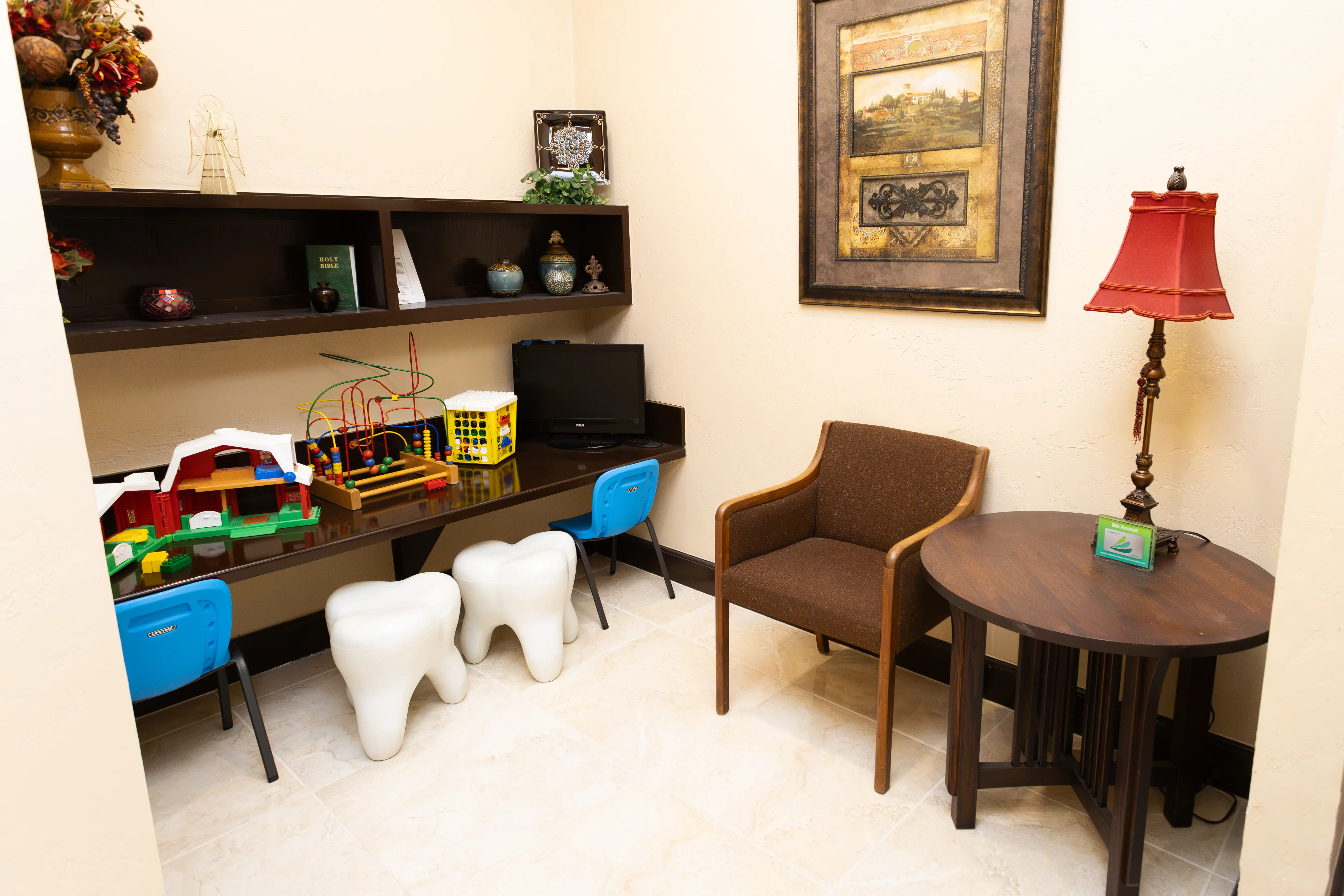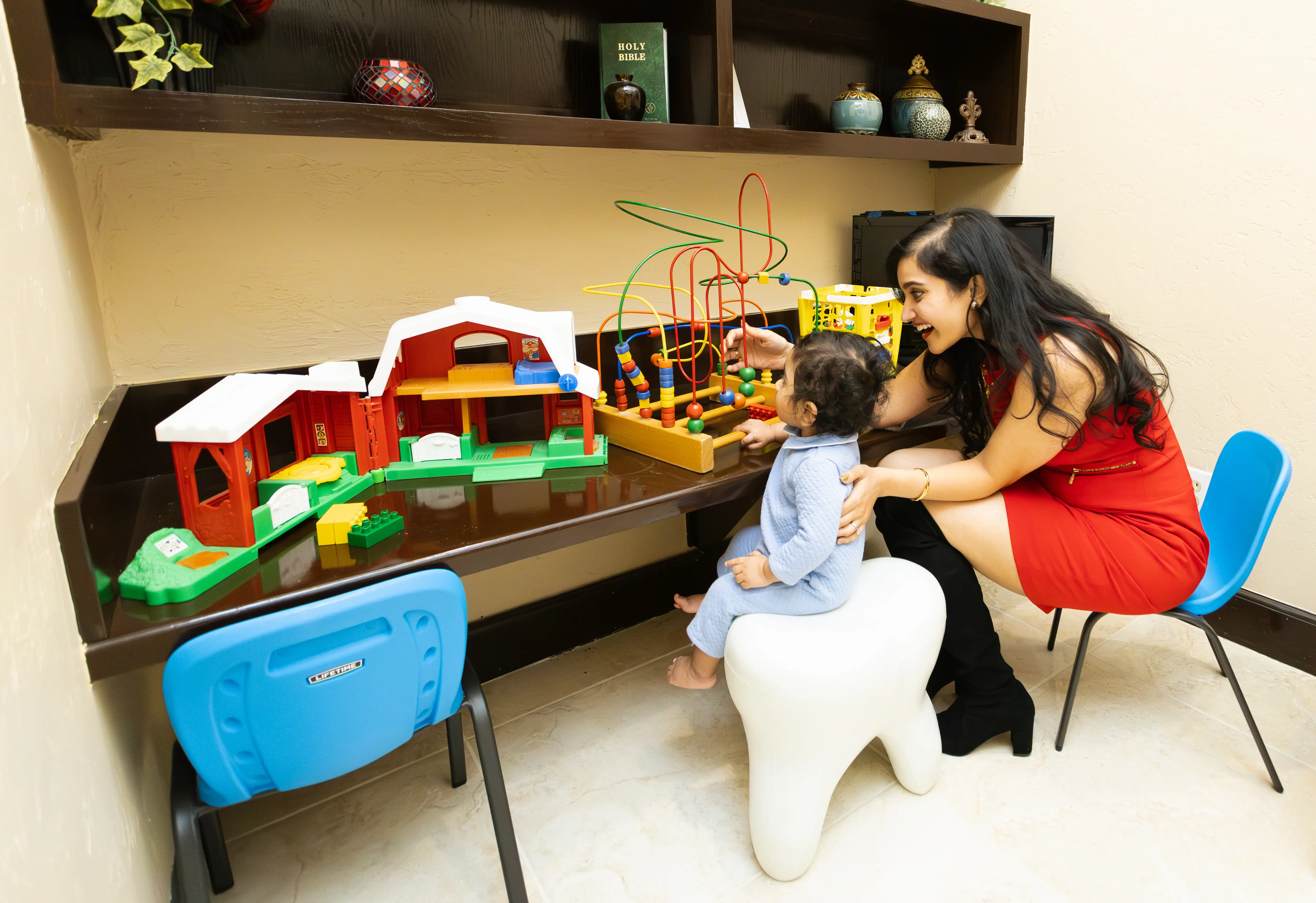
Children’s Dentistry
in Plano, TX
The Best Possible Care For Your Children
Our Approach to Children’s Dentistry
At Plano Family Dental, we know that a child’s early experiences with the dentist can shape how they view oral health for life. That’s why Dr. Varun P. Joseph and our caring team are dedicated to creating a welcoming, kid-friendly environment where young patients feel safe, supported, and even excited to visit the dentist.
As a parent, you do everything you can to protect your child’s health—from their nutrition to the doctors you trust. Their dental care should be no different. Building a relationship with a children’s dentist in Plano early on helps prevent fear, supports healthy habits, and ensures your child enjoys a lifetime of confident, cavity-free smiles.


The First Visit
Our dentists recommend bringing your child in around the age of three for their first official dental appointment. At this age, many children are ready for their first gentle cleaning and “ride” in the dental chair.
During this visit, we’ll count their teeth, explain each step in simple, friendly terms, and ensure they feel comfortable every step of the way. No treatment or procedures will be performed without your child’s full comfort and cooperation.
These early visits help us monitor oral development, identify concerns before they become problems, and teach your child that visiting the dentist is a positive, even fun experience.
You could be next!
From complete smile makeovers to minor cosmetic touch-ups, our experienced team has a proven track record of delivering life-changing results.

Our Patients Love Us!
Patient Experiences

.svg)
.svg)


Helping Children Overcome Dental Anxiety
It’s completely normal for kids to feel nervous about going to the dentist. In fact, studies show nearly 1 in 5 children under 8 have dental anxiety. Dr. Joseph is experienced in helping children overcome their fears through kindness, communication, and patience.
Here’s how we work together—parents and our dental team—to ease anxiety:
What parents can do:
- Talk positively about the dentist beforehand.
- Let your child know they’ll be visiting a fun, safe place.
- Avoid surprise visits—kids do better when they’re prepared.
- Use our online patient resources to complete forms ahead of time and note any concerns.
What our team does:
- Welcome your child warmly at the door.
- Engage with them in our kid-friendly spaces.
- Use simple words to explain each step.
- Ask fun questions to help them relax.
If needed, we also offer gentle options like conscious sedation, though it’s rarely necessary thanks to Dr. Joseph’s comforting approach.
Have questions or want to talk to us before your child’s first visit? Contact us here or call us at 972-867-5090.
Why Primary (Baby) Teeth Are So Important
It’s a common question: “Why worry about baby teeth if they’re just going to fall out?”
The truth is, baby teeth play a major role in your child’s development. They:
- Help your child learn to speak clearly
- Support chewing and healthy eating habits
- Guide permanent teeth into their correct positions
If baby teeth are lost too early due to decay or injury, it can cause spacing issues or misalignment of adult teeth. Regular checkups allow us to protect your child’s oral development every step of the way.


What to do When Your Child has a Dental Emergency?
Accidents happen—whether on the playground or at home. Knowing how to react during a dental emergency can mean the difference between saving and losing a tooth.
If your child experiences a dental emergency, call us immediately at 972-867-5090.
To help reduce the risk of dental injuries, Dr. Joseph recommends:
- Wearing a custom-fit sports mouthguard during athletic activities
- Never using teeth to open items (use scissors instead)
- Avoiding running or playing with objects in the mouth
- Installing gates to prevent dangerous falls
- Visiting the dentist every 6 months to ensure healthy, strong teeth
Preventing Tooth Decay and Cavities for Children
Did you know tooth decay is the most common chronic disease among children—even more than asthma? The good news: it’s highly preventable with the right care and habits.
Here are key ways to protect your child’s smile:
- Begin brushing with a soft-bristled infant brush as soon as the first tooth appears
- Help your child brush and floss until they’re around 7–8 years old
- Use fluoride toothpaste once your child can spit
- Maintain consistent brushing (twice a day) and flossing (once a day)
- Provide tooth-friendly snacks like fruits and vegetables
- Lead by example—let your child see you brushing and flossing too
- Stay on schedule with biannual checkups at Plano Family Dental
We may also recommend additional preventive treatments like dental sealants or Invisalign Teen depending on your child’s age and needs.

Children’s Dentistry
Treatments
When they're ready, we'll provide your child with cleanings to remove the excess plaque buildup that contributes to tooth decay and cavities. As they grow, we'll also take x-rays to monitor their development. Our dentists may also recommend treatment with fluoride to help build and strengthen your little one's developing teeth.
As your son or daughter gets older, our dentists may recommend sealants to cover the chewing surfaces of their back teeth. This thin protective coating prevents the acids that cause cavities from damaging their enamel.
If your little one does encounter tooth decay, we will use tooth-colored fillings to restore their teeth to health and preserve the aesthetics of their smile.
Sometimes removing a tooth becomes necessary in order to protect your child's oral health. Our dentists will explain why this procedure is needed and gently guide your family through the process.
If a tooth becomes broken, cracked, or damaged by decay beyond what a filling can repair, a crown may be necessary to preserve your child's tooth. A crown fits over the remaining tooth structure and protects the root of their tooth.
Since more than half of dental emergencies are sports-related, if your son or daughter participates in sports, it's important to protect their teeth and mouth from injury. Your dentist in Plano can recommend the right mouthguard for your child's needs as a custom fit offers better protection from injury.

FAQs
The first visit is usually short and simple. In most cases, we focus on getting to know your child and giving you some basic information about dental care. The doctor will check your child’s teeth for placement and health, and will look for any potential problems with the gums and jaw. If necessary, we may do a bit of cleaning. We will also answer any questions you have about how to care for your child’s teeth as they develop, and provide helpful materials.
The best preparation for your child’s first visit to our office is maintaining a positive attitude. Children pick up on adults’ apprehensions, and if you make negative comments about trips to the dentist, your child will fear an unpleasant experience and act accordingly. Show your child the pictures of the office and staff on the website. Let your child know that it’s important to keep his teeth and gums healthy, and that the doctor will help him do that.
We generally recommend scheduling checkups every six months. Depending on the circumstances of your child’s oral health, we may recommend more frequent visits.
Although they don’t last as long as permanent teeth, your child’s first teeth play an important role in his development. These primary teeth help your little one speak, smile, and chew properly. They also hold space in the jaw for permanent teeth. Losing a tooth too early due to damage or decay can result in crooked or misplaced permanent teeth, and general health is also affected by the health of teeth and gums.
Even before your baby’s first tooth appears, we recommend cleaning his gums after feedings with a damp, soft washcloth. As soon as his first tooth appears, you can start using a toothbrush. Choose a toothbrush with soft bristles and a small head, which you can find designed for infants at your local drugstore.
Once your child has a few teeth, you can start using toothpaste. Use only a tiny amount of fluoridated toothpaste (the size of a grain of rice) for each cleaning. Have your child rinse and spit out toothpaste after brushing. Swallowing too much fluoride toothpaste can cause teeth to stain. Brush your child’s teeth for him until he is ready to take on that responsibility himself, which usually happens by age six or seven.
Certain types of bacteria live in our mouths. When these bacteria come into contact with sugary foods left behind on teeth after eating, acids are produced. These acids attack the enamel on the exterior of the teeth, eventually eating through the enamel and creating holes in the teeth, which we call cavities.
Be sure that your child brushes his teeth at least twice a day with fluoride toothpaste. Flossing daily is also important, as it reaches spots between the teeth that brushing can’t. Check with your pediatric dentist about a fluoride supplement. Avoid sugary foods and drinks, limit snacking, maintain a healthy diet, and make regular appointments for professional cleanings.
Sealants cover the pits and fissures in teeth that are difficult to brush and therefore susceptible to decay. We recommend sealants as a safe, simple way to help your child avoid cavities, especially for molars, which are hardest to reach.
Even children’s sports involve contact, and we recommend mouthguards for children active in sports. If your little one plays baseball, soccer, or other sports, ask us about having a custom-fitted mouthguard made to protect his teeth, lips, cheeks, and gums.
The majority of children suck their thumbs or fingers as infants, and most grow out of it by the age of four, without causing any permanent damage to their teeth. If your child continues sucking after permanent teeth erupt, or if he sucks aggressively, let us know and we can check to see if any problems may arise from the habit.
We recommend taking X-rays around the age of two or three. The first set consists of simple pictures of the front upper and lower teeth, which familiarizes your child with the process. Once the baby teeth in the back are touching one another, regular X-rays (at least yearly) are recommended. Permanent teeth start coming in around age six, and X-rays help us make sure your child’s teeth and jaw are healthy and properly aligned.

Contact Plano Family Dental to Schedule Your Child's Next Visit Today
From the first baby tooth to teenage braces and beyond, Dr. Varun P. Joseph and our team are here to grow with your child’s smile. We’re proud to serve families across Plano and the surrounding communities with a gentle, family-first approach to dental care.
Ready to book your child’s next appointment? Contact us today or call us at 972-867-5090—we can’t wait to welcome your family to ours.
.png)






%202.13.24%E2%80%AFp.m.-min.avif)


